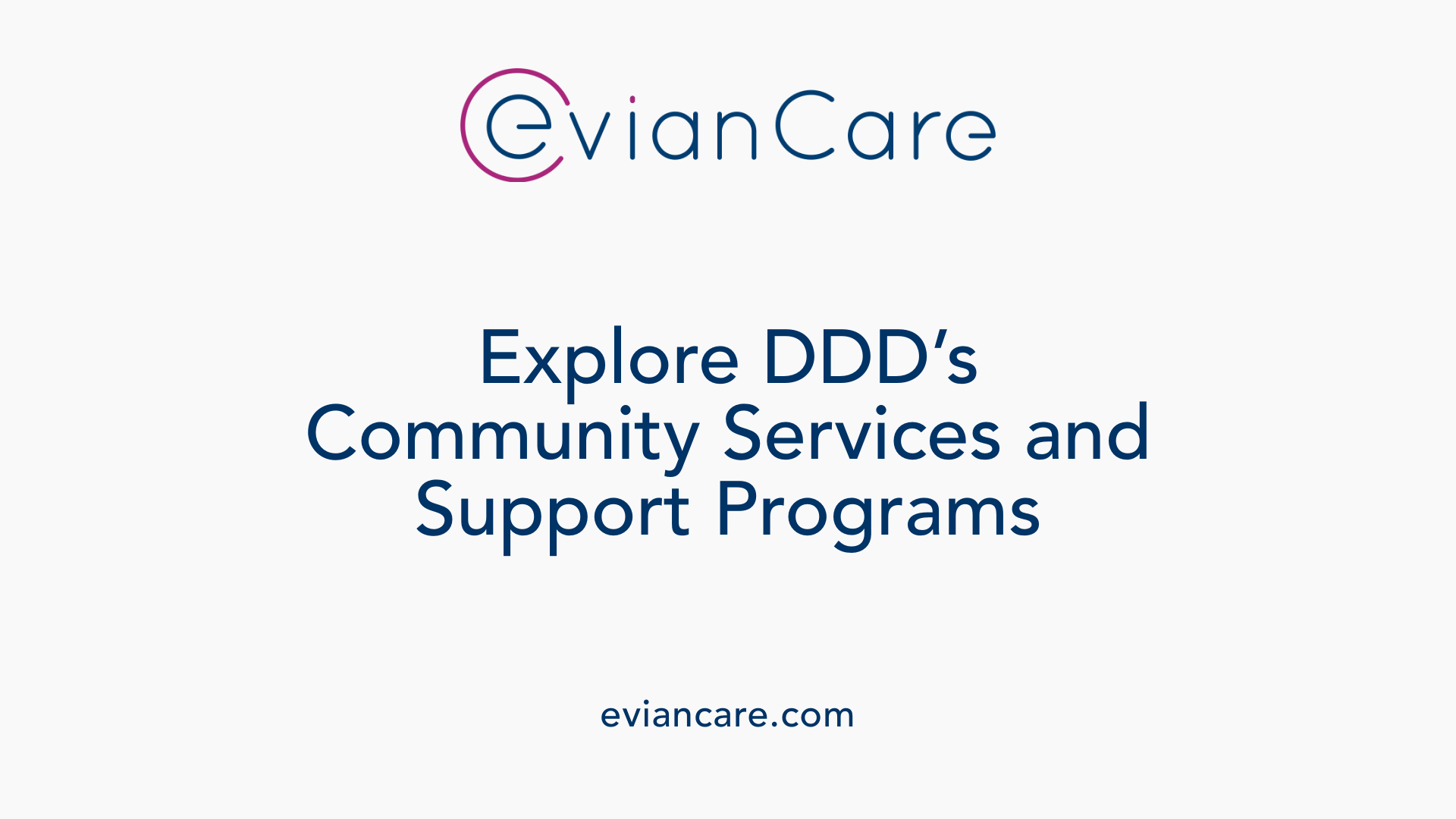
Understanding How DDD Facilitates Independence and Inclusion
The Division of Developmental Disabilities (DDD) plays a pivotal role in supporting individuals with developmental and intellectual disabilities. Its mission revolves around providing comprehensive services, promoting independence, and fostering community participation. This article delves into the purpose, goals, available programs, and application procedures related to DDD, illustrating how the division enhances the quality of life for those it serves.
Purpose and Mission of the Division of Developmental Disabilities (DDD)

What is the purpose of the Division of Developmental Disabilities (DDD)?
The Division of Developmental Disabilities (DDD) in New Jersey exists to support individuals with developmental and intellectual disabilities. Its main goal is to improve their quality of life by providing a wide range of services and resources tailored to their unique needs.
DDD works to ensure that individuals can participate fully in their communities, exercise their rights, and achieve independence. The division offers services such as Medicaid waivers—specifically the Supports Program and Community Care Program—that fund various supports including assistive technology, behavioral supports, employment aid, therapies, and transportation.
In addition to outpatient and community services, DDD operates residential facilities for those with more complex needs. It also supports children who are at risk of developing disabilities through early intervention services. Overall, DDD’s mission is to empower individuals with disabilities to live more independent, fulfilled lives and to be active members of society.
Goals and Vision for Individuals with Developmental Disabilities
What are the goals for persons with developmental disabilities?
The primary aim for individuals with developmental disabilities is to foster a life of independence and personal growth. This involves supporting them in making informed decisions about their lives, living as independently as possible, and building meaningful relationships within their communities.
Promoting community participation and social inclusion is central to these objectives. The services and programs, including home-based supports, employment opportunities, and community involvement initiatives, are designed to help individuals engage actively in social, civic, and recreational activities.
Supporting employment is a major component of the overall vision. Through supported employment programs, individuals can develop job skills, find meaningful work, and achieve economic self-sufficiency. These efforts help individuals contribute to the community and enjoy a greater sense of purpose.
Decision-making and meaningful relationships are also emphasized. Person-centered planning ensures that each individual’s preferences, dreams, and goals are prioritized. This approach helps tailor services so that they directly support personal aspirations.
The overarching goal is to improve overall quality of life by ensuring safety, health, and social inclusion. Programs like the Supports Program and Community Care Program are structured around these ideals, aiming to provide flexible, respectful, and empowering supports.
By focusing on these areas—independence, community involvement, employment, and relationships—the division strives to enable individuals with developmental disabilities to lead fulfilling, autonomous lives. With ongoing support, advocacy, and access to meaningful opportunities, they are encouraged to realize their full potential.
Support Programs and Community-Based Services Offered by DDD

What support programs and services are offered by DDD?
The Division of Developmental Disabilities (DDD) provides an extensive array of community-oriented services aimed at helping individuals with developmental disabilities lead more independent and fulfilling lives. These services include residential support in homes or community settings, employment opportunities with coaching and training, engaging day programs, personal care support, respite care, and behavioral supports for various needs.
In addition to direct services, DDD administers Medicaid waiver programs like the Hawaii Medicaid 1915(c) Home and Community-Based Services Waiver. These waivers fund many community-based services, ensuring that supports are delivered in a manner that promotes inclusion and community participation.
For those who do not qualify for Medicaid Waivers, DDD offers state-funded services through a person-centered planning process. Programs such as the Long-Term Adult Supports & Resources (LASR) and Family Services and Supports Program (FSSP) provide additional assistance, emphasizing help tailored to the individual's unique needs.
Support coordination and self-directed services are integral parts of DDD’s offerings. Support Coordinators assist individuals in planning, accessing, and managing services. Self-directed options give individuals and families more control over their supports, including employment-related services, assistive technology, and environmental modifications.
Another notable program is the Supports Program (SP), launched in 2023, which supports over 25,000 adults with developmental disabilities. It develops an individual support budget and provides services like supported employment, behavioral management, and community-based supports, aiming to reduce waiting lists and increase funding for services.
Overall, DDD’s community-based programs are designed to foster independence, promote social inclusion, and improve quality of life for individuals with developmental disabilities.
Range of community-based services and supports
| Service Type | Description | Purpose | Example Activities |
|---|---|---|---|
| Residential Services | Support for living in group homes, apartments, or supported housing | Promote independence and safe housing | Home management, daily living assistance |
| Employment Supports | Workforce development, job coaching, and training | Assist individuals in competitive employment | Resume writing, job placement, on-the-job coaching |
| Day Programs | Social, educational, and vocational activities during weekdays | Foster community engagement and skill-building | Arts classes, community outings, skill workshops |
| Behavioral Supports | Strategies to manage challenging behaviors | Enhance well-being and community integration | Behavioral intervention plans |
| Assistive Technology | Devices and modifications to facilitate daily activities | Increase independence | Communication devices, environmental modifications |
| Transportation | Help with travel to and from services or work | Support mobility | Accessible transit options |
Medicaid waiver programs like CCP and SP
| Program Name | Introduction Year | Focus | Support Levels | Number of Participants |
|---|---|---|---|---|
| Community Care Program (CCP) | 1985 | Alternatives to institutional care | Intensive supports for home and community living | Over 11,000 |
| Supports Program (SP) | 2016 | Broader access to in-home and community supports | Varies based on individual needs | Over 25,000 (since 2023) |
Eligibility requirements and support levels
| Criterion | Details |
|---|---|
| Age | 21 years or older |
| Medicaid Eligibility | Must be enrolled and maintain eligibility |
| Functional Eligibility | Must meet criteria indicating a developmental disability manifesting before age 22 and substantially limiting at least three life activities |
| Program Enrollment | Can only participate in one of the programs at a time, though support levels and services differ |
These programs and services exemplify DDD’s commitment to community integration, independence, and tailored supports, making sure individuals with developmental disabilities receive the right assistance to thrive in their communities.
Accessing DDD Services and Supports: Application and Eligibility Process
 Individuals with developmental disabilities seeking support from the Division of Developmental Disabilities (DDD) must go through a clear eligibility and application process.
Individuals with developmental disabilities seeking support from the Division of Developmental Disabilities (DDD) must go through a clear eligibility and application process.
Eligibility criteria and documentation needed are foundational for accessing services. To qualify, individuals must demonstrate a severe, chronic disability that manifests before age 22, such as mental retardation, cerebral palsy, autism, epilepsy, spina bifida, or neurological impairments. This disability must substantially limit at least three areas of daily life, including self-care, communication, mobility, self-direction, economic independence, or independent living.
Applicants need to provide various documents to establish their eligibility. These include medical records, psychological evaluations, proof of residency, age verification, citizenship status, and other legal documents. For children under age 3, eligibility can be based on developmental delays or diagnosed conditions. For those aged 18 to 21, services may also be accessed through the NJ Children’s System of Care if applicable.
Application procedures may be completed through multiple channels. Interested individuals can apply online via the DDD or related state websites, or potentially through mailing in completed forms and supporting documentation. Many local support agencies, like county boards of social services, also assist in the application process, providing in-person help and guidance.
The application involves filling out a full DDD intake form and submitting necessary paperwork. Once received, the application is reviewed, and an assessment is scheduled.
Assessment tools and support planning are integral to determining eligibility and support levels. The NJ Comprehensive Assessment Tool (NJCAT) evaluates skills across areas such as independent living, communication, and mobility. The results help determine the funding tier and the kind of services an individual will receive.
After eligibility is confirmed, support coordinators work with individuals and their families to develop an Individualized Service Plan (ISP). This plan details specific supports, services needed, and goals, tailored to each person’s unique needs.
Accessing supports involves ongoing review and documentation to maintain eligibility, participation in service planning, and coordination with support agencies.
More information about how to apply, eligibility requirements, and available services can be found by searching with the keywords: “How to apply for DDD services and eligibility criteria.” Processing times for eligibility decisions typically span up to 60 days.
| Step | Description | Additional Notes |
|---|---|---|
| 1 | Submit application | In-person, mail, or online |
| 2 | Provide documentation | Medical, psychological, residency, legal |
| 3 | Complete assessment | NJCAT evaluates functional needs |
| 4 | Support plan development | ISP created with support coordinator |
| 5 | Approval and service access | Ongoing review and support updates |
Service Delivery Models and Support Coordination

What is the fee-for-service model and how does it offer individual control?
The Division of Developmental Disabilities (DDD) employs a fee-for-service (FFS) system to fund services for individuals with developmental disabilities. Instead of providing fixed packages, this model allocates a budget based on an individual’s assessed needs. Participants can then use these funds to pay for specific services, like employment support, therapies, or community activities.
This approach grants individuals more control over their services. They can choose preferred providers—whether through approved organizations or self-directed arrangements—and tailor their supports to their personal goals. The flexible funding enables people to decide what services best suit their unique circumstances, encouraging independence and community integration.
Active participation is essential. Individuals need to understand their budgets, navigate the system, and make informed choices about provider options. This structure empowers them to take charge of their supports and adapt services as their needs or preferences evolve.
What are the roles and responsibilities of support coordination?
Support coordination agencies play a vital role in helping individuals access the full range of available services. Support Coordinators assist with navigating complex systems, applying for programs, and understanding eligibility criteria.
A core responsibility is developing and maintaining the Individualized Service Plan (ISP). The ISP is a person-centered document that outlines specific supports, services, and goals tailored to the individual’s needs. Support Coordinators work closely with individuals and their families to identify appropriate community resources and ensure services align with personal aspirations.
They also serve as advocates, helping individuals resolve issues, modify plans, and ensure their rights are protected. Regular contact is maintained to review progress, update goals, and adapt services to changing circumstances. This ongoing support is crucial for fostering independence and community participation.
How is the development of the Individualized Service Plan (ISP) conducted?
Creating an ISP involves a collaborative, person-centered process. Support Coordinators gather information about the individual’s strengths, needs, and preferences through assessments and discussions.
They then work with the individual to set realistic goals and identify services that support those objectives. The plan specifies types of services, providers, budget allocations, and desired outcomes.
Review meetings are held periodically to evaluate progress, address challenges, and modify the ISP as needed. This dynamic process ensures supports stay relevant and effective, promoting a meaningful and independent life.
The ISP development emphasizes respecting personal choices, fostering community involvement, and aligning services with the individual’s aspirations. Support Coordinators serve as guides and advocates, ensuring a person-centered approach that prioritizes individual control and satisfaction.
Fostering Independence and Community Integration
The Division of Developmental Disabilities is committed to empowering individuals with developmental disabilities by providing tailored services and supports across various domains. Through comprehensive programs, personalized planning, and community partnerships, DDD works to help individuals achieve self-sufficiency, participate fully in society, and live meaningful lives. Navigating the system requires understanding eligibility criteria, application procedures, and available resources—yet the ultimate goal remains clear: supporting each person’s unique journey toward independence.
References
- Supports Program and Community Care - NJ.gov
- Division of Developmental Disabilities | About the Division - NJ.gov
- DDD Eligibility Go Bag - The Arc of New Jersey Family Institute
- How to Navigate the NJ Developmental Disabilities Assistance System
- [PDF] DDD Employment Support Services - Disability Rights New Jersey
- DDD Community Based Supports (CBS) - Faith Home Healthcare
- DDD / DMHS / CCW Resources : Criminal Justice Advocacy Program
- DDD of NJ: Understanding The Services - Your Choice Home Care
- The Supports Program | DDD Programs - SCARC
- Office for People With Developmental Disabilities | Office for People ...












